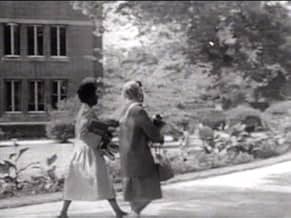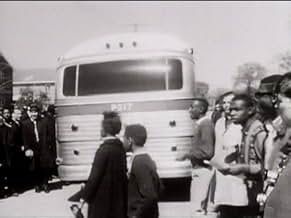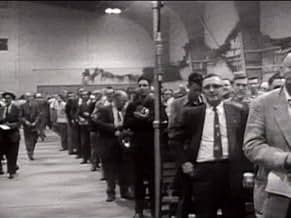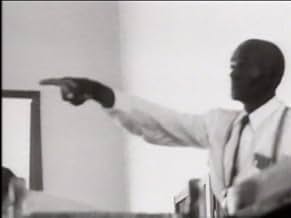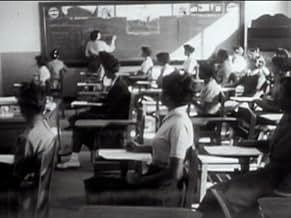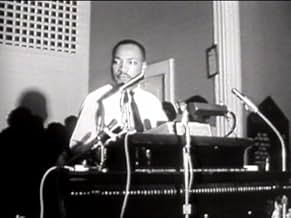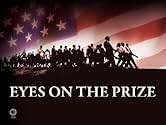अपनी भाषा में प्लॉट जोड़ेंA documentary about the American Civil Rights Movement from 1952 to 1965.A documentary about the American Civil Rights Movement from 1952 to 1965.A documentary about the American Civil Rights Movement from 1952 to 1965.
- 1 ऑस्कर के लिए नामांकित
- 11 जीत और कुल 5 नामांकन
एपिसोड ब्राउज़ करें
फ़ीचर्ड समीक्षाएं
In 1987 I saw the Eyes on the Prize series in it's ENTIRETY.
Those too young to remember or those not. Yet born don't know that the history from this documentary is Missing the years following 1965. Why?
The public libraries have removed those years after 1965 from the shelves. Why? I decided to give Part One 10 stars because it is deserving.
Where's Part 2? And Why is it kept from this generation? Tell them. I know exactly Why.. In the series following 1965 there's a shift and split between the King Nonviolent ideologies and SNCC. Stokely Carmichael challenges King
The Watts riots takes place. Nonviolent strategies are questioned by a younger generation. The war in Vietnam is called into question by Dr. King. In 1966 or 7 he visits Cicero in Chicago where he's met with people who are more violent than in the South..
The Black Panther Party arrives in the seen after jung is assassinated. My children...Thank God had the chance to know and learn about the missing documentary. It's unfortunate this generation won't.
Those too young to remember or those not. Yet born don't know that the history from this documentary is Missing the years following 1965. Why?
The public libraries have removed those years after 1965 from the shelves. Why? I decided to give Part One 10 stars because it is deserving.
Where's Part 2? And Why is it kept from this generation? Tell them. I know exactly Why.. In the series following 1965 there's a shift and split between the King Nonviolent ideologies and SNCC. Stokely Carmichael challenges King
The Watts riots takes place. Nonviolent strategies are questioned by a younger generation. The war in Vietnam is called into question by Dr. King. In 1966 or 7 he visits Cicero in Chicago where he's met with people who are more violent than in the South..
The Black Panther Party arrives in the seen after jung is assassinated. My children...Thank God had the chance to know and learn about the missing documentary. It's unfortunate this generation won't.
"Eyes on the Prize" is an amazingly good and very thorough series about the civil rights movement in America from 1954-1965. While lots of shows have been made about this over the years, this one is the one to watch because of its length and breadth. Now I am not saying it's perfect--it could use an updating and doesn't really talk about the treatment of Black Americans before the mid-1950s and probably would have been better had it covered the late 60s...but it's still terrific. The shows are filled with lots of archival footage, interviews and nice narration. The shows are also very compelling--and well worth your time--and very educational. Great for kids and those not old enough to remember this turbulent time--a time we should all try to remember. See this one.
This series (along with the sequel, "Eyes on the Prize II") is a classic documentary that, in many ways, pointed to the techniques later adapted by Ken Burns in his documentaries. Given the availability of film and first-person accounts, as well as photos, this is a far more moving and affecting film. Beginnings are difficult, and one might quibble with how the first part brings the viewer "up to speed" on African American history before the 1950's, the immediate attention to the story of Emmitt Till makes up for much of that missing narrative, by showing in graphic detail the status of African Americans in the United States, particularly the deep South. The rest of the series fills in a great amount of detail in the ensuing decade up to 1965 and the Voter-Rights act of that year.
Three things to point out in detail that made this a strong film. First, the framing of the narrative before Brown v. Board to emphasize that the Brown case did not come about in isolation, but as part of a broader strategy of the NAACP (if you are further interested in this, you should look at "The Road to Brown") led by Charles Houston and Thurgood Marshall. Second, the film did not solely rely on newsreel footage and interviews, but effectively used still photos to convey drama and set pacing. On that last issue, the third point (which may have been for cost and copyright reasons for all I know) was the minimal use of music in the film. Some of the most powerful moments in the film come from a long (4-5 seconds) shot of a dramatic photo with only silence.
Why only 9 stars and not 10? I would like to have seen a bit more in the lead up to the 1950's, and some emphasis on larger context of the Cold War and such -- particularly a bit more on radical African Americans who were targeted by the state for prosecution before the forties, as well as more on the legacies of W.E.B. Dubois and Booker T. Washington as backdrop for later debates within the movement. These are really historical concerns, and overall, the film is worth seeing. I hope that soon the copyright issues will be sorted out so that this can be released on DVD, as many video copies available now are showing their age after many viewings!
Three things to point out in detail that made this a strong film. First, the framing of the narrative before Brown v. Board to emphasize that the Brown case did not come about in isolation, but as part of a broader strategy of the NAACP (if you are further interested in this, you should look at "The Road to Brown") led by Charles Houston and Thurgood Marshall. Second, the film did not solely rely on newsreel footage and interviews, but effectively used still photos to convey drama and set pacing. On that last issue, the third point (which may have been for cost and copyright reasons for all I know) was the minimal use of music in the film. Some of the most powerful moments in the film come from a long (4-5 seconds) shot of a dramatic photo with only silence.
Why only 9 stars and not 10? I would like to have seen a bit more in the lead up to the 1950's, and some emphasis on larger context of the Cold War and such -- particularly a bit more on radical African Americans who were targeted by the state for prosecution before the forties, as well as more on the legacies of W.E.B. Dubois and Booker T. Washington as backdrop for later debates within the movement. These are really historical concerns, and overall, the film is worth seeing. I hope that soon the copyright issues will be sorted out so that this can be released on DVD, as many video copies available now are showing their age after many viewings!
I've watched this dozens of times. It is the most important documentary series ever made. Not even Ken Burns finest work, or Errol Morris, have anything on this series.
FYI The IMDB tagline describes this as a documentary about the Civil Rights movement "1952-1965". It covers 1952 thru the early 1980's.
Surely the original film makers are retired or passed on, but it would be amazing to see a second volume or new episodes of this series. 1980-2020.
FYI The IMDB tagline describes this as a documentary about the Civil Rights movement "1952-1965". It covers 1952 thru the early 1980's.
Surely the original film makers are retired or passed on, but it would be amazing to see a second volume or new episodes of this series. 1980-2020.
The late Henry Hampton, director of "Eyes on the Prize," was one of the finest human beings I've ever known. It's bittersweet to read of the licensing challenges faced by Henry's Boston company, Blackside, Inc. That might prove, however, that one cannot "keep a good man and his film down." Eighteen years ago Henry had me doing paperwork for him including transcribing the equivalent of dailies. "All Hours Typing," my Cambridge company, had other employees; but for Henry, I usurped the privilege to type, eyes on monitor, earphones on, at points where spirituals swelled up, spirits soared on screen--breath taking and moving then and now. Then to find later that Henry was one of those "still waters that ran deep"-- having been the key public information player for the broad minded Unitarian Universalist church. This documentary is not only great film making but a tribute to his memory and the Blackside team listed on IMDb plus Judy Richardson, Frank Galvin, and Josh Gordon.
क्या आपको पता है
- ट्रिवियाThe series was unavailable from 1995 to 2006 owing to copyright issues. Licenses for "Happy Birthday", news footage, various photographs, songs, and lyrics used in the film expired in 1995, and the film company Blackside could not afford to renew these licenses. A grant from the Ford Foundation enabled them to renew the licenses. The series was rebroadcast and released to DVD in October 2006.
टॉप पसंद
रेटिंग देने के लिए साइन-इन करें और वैयक्तिकृत सुझावों के लिए वॉचलिस्ट करें
- How many seasons does Eyes on the Prize have?Alexa द्वारा संचालित
विवरण
- रिलीज़ की तारीख़
- कंट्री ऑफ़ ओरिजिन
- भाषा
- इस रूप में भी जाना जाता है
- Eyes on the Prize II
- उत्पादन कंपनी
- IMDbPro पर और कंपनी क्रेडिट देखें
- चलने की अवधि6 घंटे
- रंग
इस पेज में योगदान दें
किसी बदलाव का सुझाव दें या अनुपलब्ध कॉन्टेंट जोड़ें



